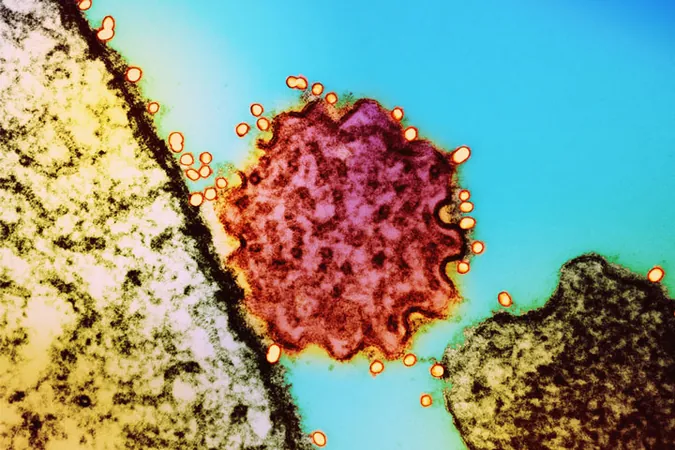
Unlocking the Secrets of Our Stress Response: The Fight-or-Flight Reset Mechanism Revealed!
2025-05-29
Author: Sarah
Revealing the Hidden Cycle of Stress Responses
Ever felt your heart race from getting cut off in traffic or the anxiety before a big presentation? These common scenarios trigger a complex physiological response known as the "fight-or-flight" mechanism, which helps the body swiftly cope with stress or hunger. Recent groundbreaking research from Penn State has shed light on the molecular cycle behind this phenomenon, detailing how it resets itself for new challenges.
A Major Discovery in Stress Response Research
Published in the Journal of the American Chemical Society, the findings highlight the vital role of Protein Kinase A (PKA) in regulating various cellular processes ranging from metabolism to memory formation. "This cycle is crucial, especially when we consider how everyday substances like caffeine affect our responses to stress," explains Ganesh Anand, the lead researcher and associate professor at Penn State.
How the Fight-or-Flight Cycle Works
When stress hormones like adrenaline and glucagon are released, they kick-start an intricate molecular cycle leading to the activation of PKA. This mechanism fluctuates between active and inactive states across all cells, from yeast to humans. However, the specifics of how the cycle resets after each stressor remained elusive until now.
The Delicate Balancing Act of Stress Responses
Anand emphasizes the importance of this reset: "You don't want your body stuck in a perpetual state of stress. A malfunction in this resetting process can lead to serious health issues such as cardiovascular diseases or metabolic syndromes. Our objective was to determine not just how long this cycle stays active, but how we can effectively turn it off."
Unlocking Molecular Dynamics with Advanced Imaging Techniques
Using cutting-edge imaging techniques like cryo-electron microscopy, coupled with various biochemical methods, the team discovered three new conformations of the PKA complex that occur during the reset. "Molecules are not just static entities; they are in constant motion, almost as if they're breathing," Anand illustrates.
The Role of Phosphodiesterase Proteins
Integral to this reset cycle are phosphodiesterase proteins (PDE), which dismantle cAMP from the PKA complex, switching it back to an inactive state. As cAMP builds up within cells, the cycle can be tracked, showing that the system can become increasingly efficient with repeated activation.
Caffeine and Stress: A Double-Edged Sword?
The researchers point out that modern life bombards us with stimuli, including caffeine, which can hinder the reset mechanism. "Caffeine acts as a PDE inhibitor, allowing the body to experience the buzz from stress without the actual pressure. We hope to explore whether by keeping this system in a reset state longer, we could mitigate stress effects," Anand speculated.
Future Implications: Tackling Stress and Beyond
These insights not only deepen our understanding of how our bodies handle stress but could also pave the way for developing treatments targeting related disorders. By comprehending the reset dynamics of such proteins, we may revolutionize how we fight stress in our increasingly busy lives.
A New Frontier in Protein Research
The integrative approach used in this research, combining cryo-electron microscopy with mass spectrometry and biochemical methods, could enable similar discoveries across a variety of protein complexes, offering endless opportunities for scientific exploration.



 Brasil (PT)
Brasil (PT)
 Canada (EN)
Canada (EN)
 Chile (ES)
Chile (ES)
 Česko (CS)
Česko (CS)
 대한민국 (KO)
대한민국 (KO)
 España (ES)
España (ES)
 France (FR)
France (FR)
 Hong Kong (EN)
Hong Kong (EN)
 Italia (IT)
Italia (IT)
 日本 (JA)
日本 (JA)
 Magyarország (HU)
Magyarország (HU)
 Norge (NO)
Norge (NO)
 Polska (PL)
Polska (PL)
 Schweiz (DE)
Schweiz (DE)
 Singapore (EN)
Singapore (EN)
 Sverige (SV)
Sverige (SV)
 Suomi (FI)
Suomi (FI)
 Türkiye (TR)
Türkiye (TR)
 الإمارات العربية المتحدة (AR)
الإمارات العربية المتحدة (AR)